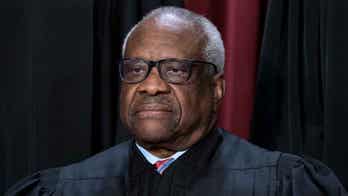
In this Feb. 11, 2005, file photo, trays of printed social security checks wait to be mailed from a facility in Philadelphia. (AP)
The inadvertent byproduct of a government shutdown is that it lets Americans in on a secret -- they can do without many federal employees, at least for a short period of time.
Though a shutdown is no longer imminent this week as lawmakers approve a temporary extension of the budget, they are squabbling over the reach of proposed cuts to the federal budget and its potential impact.
If a deal is not reached, it could mean closing the doors on federal government. Or maybe not.
Washington's federal agencies have long had contingency plans in place for how to operate on a skeleton crew if and when the money runs dry, a semi-regular occurrence in years past. And while Washington has not witnessed a significant shutdown since 1996, it and prior closures have given the public an idea of which gears the federal government considered truly critical to its day-to-day engine.
As it turns out, a government shutdown is not really a government shutdown -- "essential" workers are called upon to keep things running while thousands of "nonessential" federal employees are forced to stay home and later collect backpay.
A look at prior shutdowns should give Americans an idea of who's necessary and who, at the least, can take a few-week vacation without the country running aground.
Under the most basic legal definition, "essential" employees include anyone engaged in "military, law enforcement or direct provision of health care activities," and those who "protect life and property."
That definition is constantly being expanded and adjusted, as Washington learns from its own mistakes.
Take the Social Security Administration. During the first shutdown in 1995, the agency furloughed 90 percent of its workforce. But even though a few thousand were retained, the administration did not have enough people to perform many basic functions. So President Clinton ordered nearly 50,000 employees back to work.
While President Obama warned last month that "people don't get their Social Security checks" in the event of a shutdown, history suggests that, for the most part, the government will ensure those payments go out.
White House Press Secretary Jay Carney recently elaborated on this point, saying new retirees might not receive checks and people with questions about their checks could encounter problems.
"But the broader point is that the uncertainty created by this, the number of consequences that could unfold if this does happen, would create the kind of environment that would be harmful to the economy overall," he said.
According to the Congressional Research Service, a number of job descriptions are exempted from shutdowns.
National security and diplomatic functions would likely continue. Anybody providing medical care would stay on the job. Air traffic controllers, border security personnel, federal prison guards, federal law enforcement and emergency response teams would likewise not sit it out while Congress figures out a budget. The Mine Safety and Health Administration even kept hundreds of safety inspectors on duty during the first 1995 shutdown.
Naturally, the Capitol would remain open since the duration of any shutdown hinges on Congress. And anybody appointed by the president would also be exempt, though they are by law permitted to forfeit part of their salary during a shutdown if they wish.
So who's not essential? It should be noted that the term "nonessential" is not a favorite term in Washington. During the last shutdown debacle, some in the capital complained that the label "nonessential" was insulting.
"What's the expression -- 'what am I chopped liver?'" joked Stan Soloway, president of the Professional Services Council, a trade association that represents 330 companies that provide government contractors.
But the numbers speak for themselves.
According to testimony at a December 1995 hearing of the House oversight committee, the Department of Housing and Urban Development in 1995 released "all but 136 of nearly 12,000 employees," in turn shutting down some housing programs.
The Department of Education sent home 86 percent of its workforce.
Cato Institute budget analyst Tad DeHaven suggested those decisions were no surprise.
"A lot of these agencies basically just funnel money to the states," he said. "And they generally don't do a very good job of oversight. ... which does kind of beg the question, what are they there for?"
DeHaven, also citing a government study released Tuesday that identified billions in waste and duplication, said any government shutdown should ideally get lawmakers talking about "what should the government be doing."
The last set of shutdowns led to a number of other services being suspended, some more vital than others. The CRS research showed passport application processing fell by the wayside, as did some services for veterans, work on bankruptcy cases, disease surveillance and the processing of applications to the Bureau of Alcohol, Tobacco and Firearms. Hundreds of national parks were closed, resulting in a loss of millions of visitors.
In all about 800,000 employees were furloughed during the five-day shutdown in November 1995. That number was under 300,000 during the record 21-day shutdown that followed -- thanks to some additional funding bills.
But federal employees aren't the only ones affected. Federal contractors stand to lose billions in the event of a shutdown -- and unlike the feds, they generally don't receive backpay for their losses.
Soloway's group is still trying to get a clear sense from the government of which kinds of contractors would be allowed to keep working.
"It's going to really depend dramatically on the nature of the work that you're supporting," he said. Soloway speculated that contractors working on information systems would stay on duty, perhaps on a "skeleton crew," but those providing engineering support to non-functioning offices would stay home.
In some cases, the contractors could keep paying their employees but eat the losses.
Though the reality of a shutdown is that basic services continue, many have warned that a closure would be disastrous and have taken pains to pin blame for the scenario in advance on the opposite party.
"A government shutdown would prove devastating to the American people," J. David Cox, secretary-treasurer of the American Federation of Government Employees, said on the union's radio program last week. Referring to the 1995-96 shutdowns, he said: "The list goes on and on and on of the government services that were just shut down and did not exist."
Office of Management and Budget spokesman Kenneth Baer said in a statement that all agencies are prepared for "any contingency" as budget negotiations continue.
However, he dismissed the chatter as moot.
"All of this is besides the point since, as the congressional leadership has said on a number of occasions and as the president has made clear, no one anticipates or wants a government shutdown," he said.




